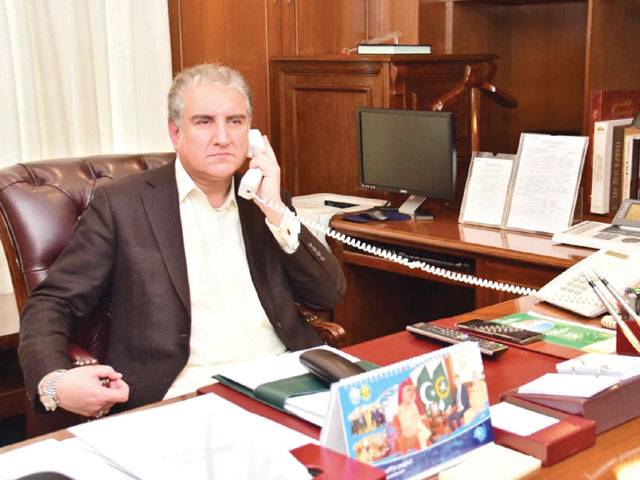ISLAMABAD - Pakistan is in contact with the influential ‘Permanent Five’ countries seeking support on Kashmir in the United Nations Security Council.
Islamabad has already sought a special UNSC session to discuss Kashmir after India merged the disputed territory into its union.
This follows Foreign Minister Shah Mehmood Qureshi’s public admission that it will be a tough task to get the support of UNSC and the Muslim world against India’s decision to revoke Kashmir’s special status.
Qureshi asked his countrymen not to live in a “fool’s paradise” adding Pakistanis needed to “wage a new struggle” to get the support of the UNSC members.
“You (people) should not live in fool’s paradise. Nobody will be standing there (in the UNSC) with garlands in hands. Nobody will be there waiting for you,” he said at a recent media interaction.
After revoking Article 370 of the Constitution, which gave special status to Kashmir, India has categorically told the international community that the move is an internal matter and has asked Pakistan to “accept the reality.”
Without naming any Muslim-majority country, FM Qureshi said, “The guardians of Ummah (Islamic nation)” might also not back Pakistan on the Kashmir issue due to their economic interest.
He said since these countries, along with many others, had invested in India, it will not be easy for them to oppose India’s stand to safeguard their economic interests.
Senior government officials told The Nation that Pakistan was in contact with the P-5 countries and was briefing them about the ‘real situation’ in held Kashmir.
“We have detailed discussions with China, the United States and the United Kingdom. There has been an FM-level contact with Russia and we are also in consultations with France,” said one official.
Another official said that FM Qureshi will visit the P-5 countries in search of much needed support to put pressure on India. Last week, Qureshi had rushed to Beijing to seek its support on Kashmir.
The P-5 members of the UNSC - also known as the Permanent Five, Big Five, or P-5 - are the five states which the UN Charter of 1945 grants a permanent seat on the UN Security Council: China, France, Russia, the United Kingdom, and the United States. These countries are all nuclear weapons states. All the five permanent members have the power of veto, which enables them to prevent the adoption of any ‘substantive’ draft Council resolution, regardless of its level of international support.
Yesterday, Foreign Minister Qureshi held a telephonic conversation with Russian counterpart Sergey Lavrov to brief him on the current situation in the Occupied Kashmir.
The Foreign Minister informed the Russian Foreign Minister about the illegal and unilateral steps taken by the Indian government to change the disputed status of Indian occupied Jammu and Kashmir and its demographic structure.
He added that these steps by India were against the UNSC resolutions on Jammu and Kashmir and International Law, said a foreign ministry statement.
The Foreign Minister underlined that Indian actions entailed grave risks for peace and security. He highlighted the severe hardships faced by the people of the occupied Kashmir in the face of unprecedented lockdown of the entire population.
The Foreign Minister apprised on the deteriorating situation of safety and security of the population in occupied Kashmir, which had been under curfew for the last ten days.
He also shared concerns about the intensified repression by Indian security forces and the possibility of false flag operation, which would further endanger peace and security in the region.
He underscored that Pakistan had already requested the President of UNSC to convene a meeting to discuss the illegal actions of India in the occupied Jammu and Kashmir.
Foreign Minister Lavrov stated that Russia was closely observing the situation. He underlined the importance of resolution of all outstanding issues through dialogue and peaceful means, said the statement. “The two leaders agreed to continue to work together for peace and stability in the region,” it added.
Earlier, Pakistan asked the UNSC to meet over India’s decision to revoke the special status of Kashmir. Foreign Minister Qureshi wrote a letter to UN Security Council asking it to convene a special meeting to discuss the illegal steps of India of changing the status quo in Kashmir.
The move by India blocks the right of the state of Jammu and Kashmir to frame its own laws and allows non-residents to buy property there. Telephone lines, internet and television networks have been blocked since the August 5 decision and there are restrictions on movement and assembly.
“Pakistan will not provoke a conflict. But India should not mistake our restraint for weakness,” Foreign Minister Qureshi wrote in a letter to the Security Council.
In a video message, he said the letter had been forwarded by Pakistan’s Permanent Representative to the United Nations Dr Maleeha Lodhi.
He said Pakistan deemed that Indian actions had jeopardized the regional as well as global peace. He said it was India’s wrong evaluation that it could crush Kashmiris’ right to self-determination.






